SEO keywords are the main ingredients when you want to attract organic traffic and engagement on your website. These are terms or phrases that can help you increase your search engine visibility. You can find your site via a search engine on search result pages.
When you need your brands to be visible to people online when they are searching for a particular product, service, or information, then you optimize your web content with the help of SEO keywords. Here, we will learn about SEO keywords and their importance in Digital marketing.
What Are SEO Keywords?
SEO Keywords are phrases or terms that consist of high search volume, as people on the internet use them to find information. When you use phrases resembling the search queries people use on the internet, it helps search engines to compare the relevancy and improve your visibility on the search engine.
- SEO Keywords help Google find the relevance of your content with the search query made on the internet.
- There are four main keyword search intents i,e. Informational, navigational, transactional, commercial.
- When you match your piece of content with intent from any of these keywords, you can increase your search ranking as well as engagement and lead conversion.
Why SEO Keywords Are Important?
SEO Keywords are the root of Search Engine Optimization practices, as these phrases form the foundation of visibility on search result pages. They help you connect with your audience and get you visible where your content might get some value.
- SEO Keywords help search engines understand what your content is about and match it with relevant queries on search pages.
- With the right keywords, you can target the right audience and gain organic traffic.
- You can increase the engagement on your webpages by using the keywords that match the intent of your search pages.
- For example, PW Skills ranks for various courses, including digital marketing, data science, AI/ML, full-stack development, and more.
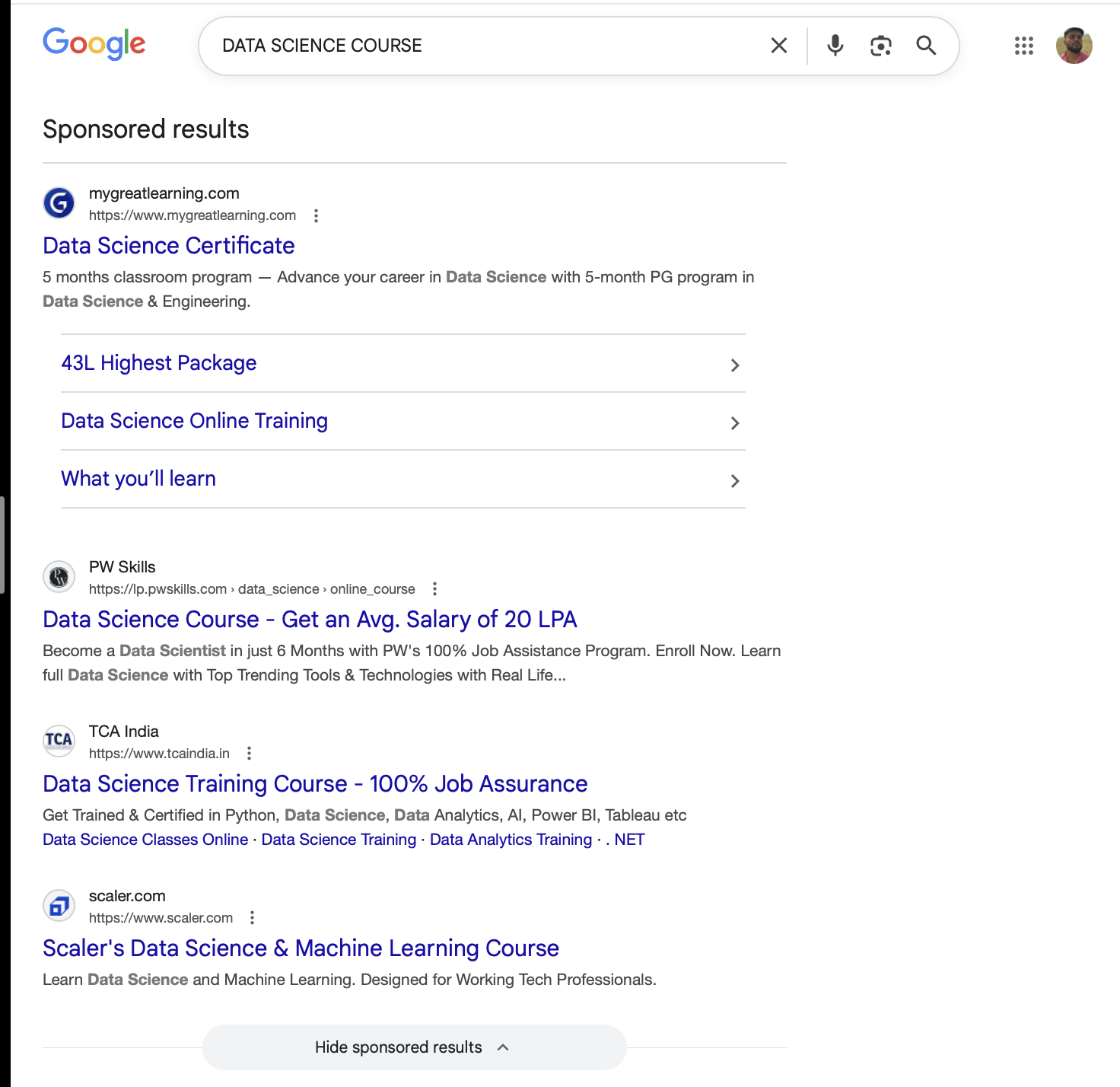
- Check “Data Science Course” PW Skills page is ranking on the top as we implemented smart SEO Keywords technique to increase our visibility on search result pages.
- When your content is optimized around phrases or words that people search for, you can rank higher for those terms.
- Ranking higher on Google SERP → Organic Traffic → Engagement → Conversions
Read More: What is SEO Content? Types, How to Write & Tips to Rank Higher
Finding the Best Keywords For Your Content
Many SEO professionals in their early stages make several mistakes that halt their growth.
- Thinking SEO Keyword Research is a one-time game
- Depending too much on a single keyword throughout the content.
- Not knowing the importance of proper distribution and frequency of usage.
- Head to head targeting popular keywords with insane competition on search pages.
Keyword research in SEO is a recurring process where professionals must know the importance of a continuously evolving part of the market. Targeting keywords with natural placement throughout the content is important. Using long tail keywords throughout the content is important, particularly when clients prefer conversions alongside the organic traffic.
Best Practices To Use SEO Keywords In 2025
You can easily find and use SEO keywords in your content and rank higher in SERPs. Check some of the best practices to consider this year.
1. Appropriate Distribution Of Keywords
Now, with Google being smart and sufficient, you cannot overstuff keywords and wish to get your content to the top. You have to understand that you only have to repeat a particular primary keyword a particular number of times throughout your content.
- Make sure the keyword density does not increase after 2% of the total words in your content.
- Distribute your keywords naturally throughout headings, title tags, meta descriptions, bylines, introductions, and content pages.
- Do not try to embed keywords where they do not deliver any meaning.
2. Using Relevant Terms & Phrases
Google uses NLP (Natural Language Processing) to understand the meaning behind the search query and match it with a relevant piece of content. Although using primary keywords, secondary keywords are also important, but you can also use some semantic synonyms of these keywords throughout your content.
For example, if “data science course” is the primary keyword, you can also include phrases like “ data science program”, “online data science course”, and more. This sends strong signals to Google about the relevance of your content.
3. Use Queries that Delivered You Results or Rankings
On Google Search Console, you can keep track of queries that your content is ranking for, and you can double down on covering content that is there in Queries, giving you ranking.

- Go to the “Performance” section on Google Search Console.
- Click on the “Search Results”

- Then look at the specific keywords in the “Queries” tab.
- You will see a handful of keywords around the topics that you’ve already covered. Pick some of these keywords and cover fresh content.
4. Make use of Keyword Research Tools
Many keyword research tools are available, which can be used to find relevant keywords, including primary keywords, secondary keywords, long tail keywords, short tail keywords, and seed keywords.
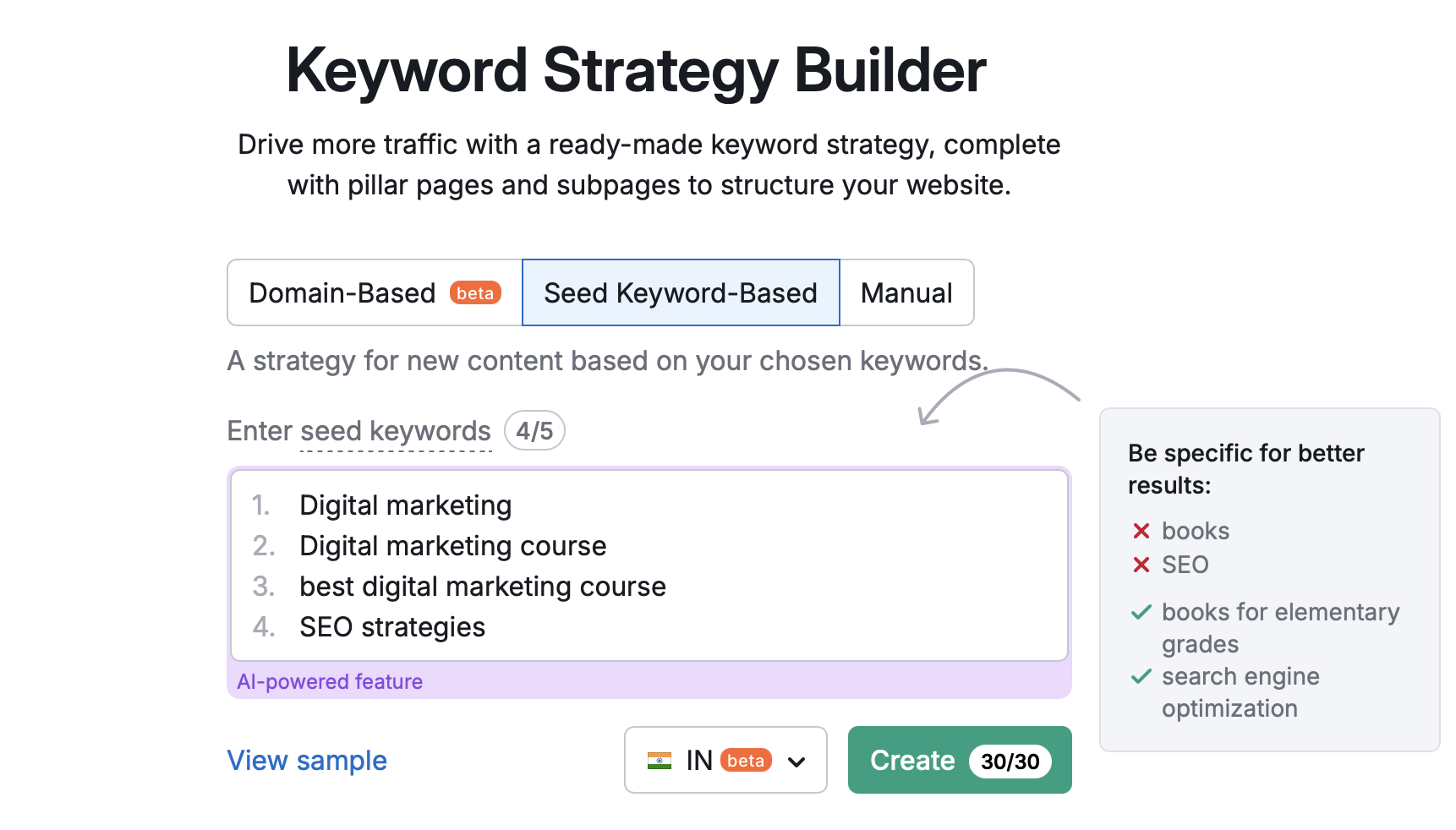
You can lock into various metrics such as search volume, intent, PPC, keyword difficulty, and more using these research tools.
5. Find Trending Keywords with Google Trends
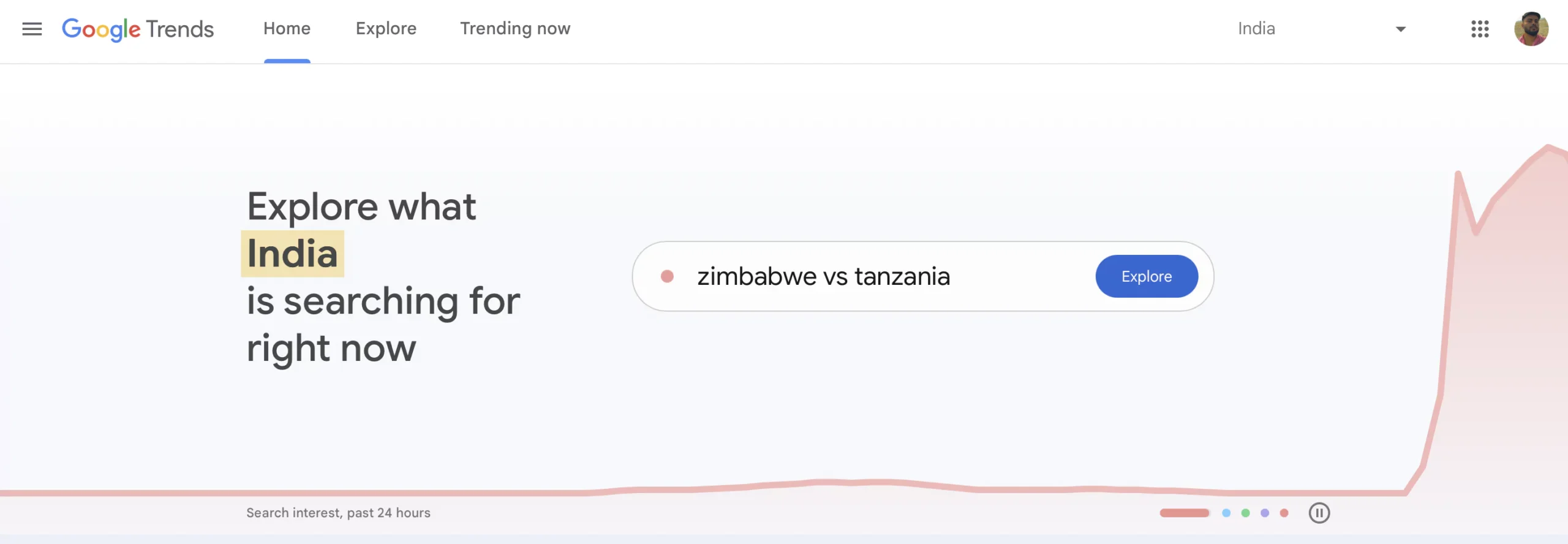
Go to Google Trends and locate keywords in your niche that are trending. You can cover content on these keywords to gain good engagement and traffic on your webpage.
- Google Trends also helps you keep in touch with the latest market trends and patterns.
- Check the “Interest over time” graph to reach a decision with Google Trends.
What Better We Can Do In 2025?
As we have smart LLM models, we can make keyword research and usage more effective. These AI models, like ChatGPT, Gemini, and Perplexity, have tons of data about billions of websites.
- Use AI to gain more in-depth research about your competitors online
- Frame attractive title tags and headings while embedding your focus keywords with the help of AI tools like ChatGPT, Gemini, and more.
- You can also find relevant long tail alternatives with the help of these smart AI tools.
- Create attractive meta descriptions and featured snippets using ChatGPT-like models.
- Optimize your SEO strategies to get citations on these AI models and gain more target traffic and conversions.
Types of SEO Keywords
Let us understand more about the three major classifications of SEO keywords mentioned below.
1. Primary vs. Secondary Keywords
Primary keywords are the main search terms you want your page to rank for. They are directly related to the topic of your content and reflect the intent. Hence, these keywords must appear at important places like the page title, meta description, H1 tag, and naturally within the body.
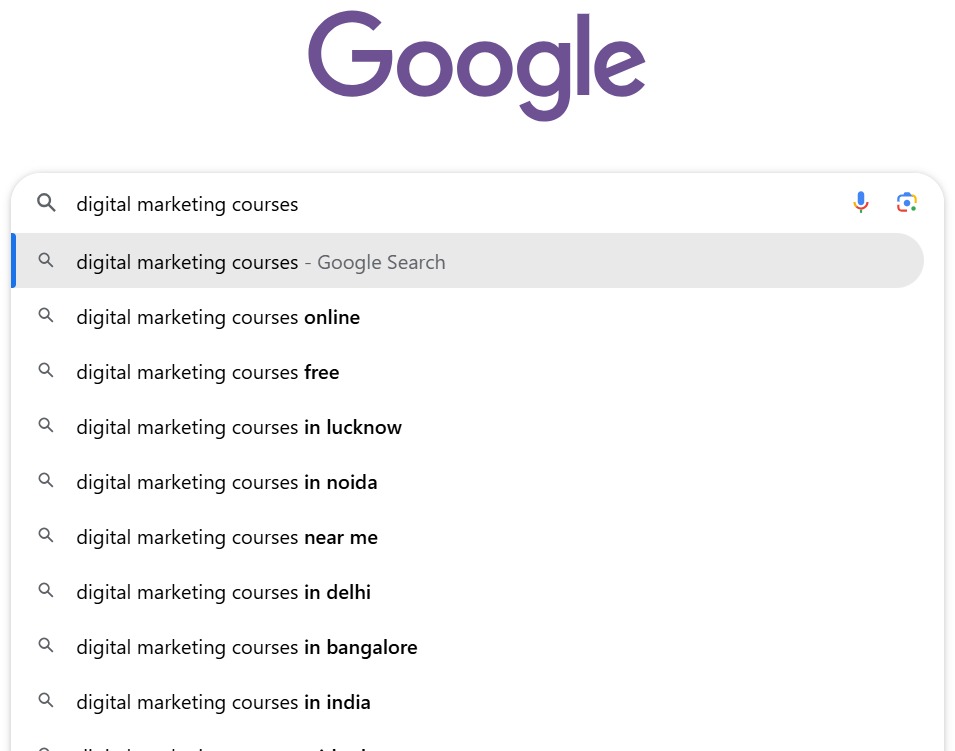
Secondary keywords are relevant phrases or terms that support the primary keyword by providing context and covering related phrases. These are best used in subheadings and throughout the content to strengthen relevance. Together, both these keywords ensure search engines clearly understand the page’s subject while helping you capture related searches.
- Primary keywords are generally one throughout the content, while secondary keywords can be two or more, depending on the availability and popularity of the topic.
- Both these keywords help search engines understand the page’s subject and match the search intent.
2. Short-tail vs. Long-tail Keywords
Short tail keywords are keywords with high search volume, covering broad general topics to bring a large audience. These keywords generally consist of high competition and are harder to rank for. These keywords work best for increasing visibility, but generally offer a lower conversion rate. Long tail keywords, on the other hand, are more specific and bring the target audience to potential conversions and engagement.
3. Branded vs. Non-branded Keywords
Branded keywords are search terms that people use to find a company or product on the internet. For example, when you search for “Puma Shoes,” this depicts that you are searching for shoes from the Puma brand. They are used by brands to help users find their official source easily.
Non-branded keywords are general terms, such as “best running shoes,” are more generic and often signal the start of a customer’s search journey. These are best suited for educational or awareness content, like blog posts, where you want to capture a broader audience and introduce them to your brand.
How to Do Keyword Research For Content?
Let us give you a simple step-by-step process for finding the best SEO keywords for your content.
1. Start with Seed Keywords
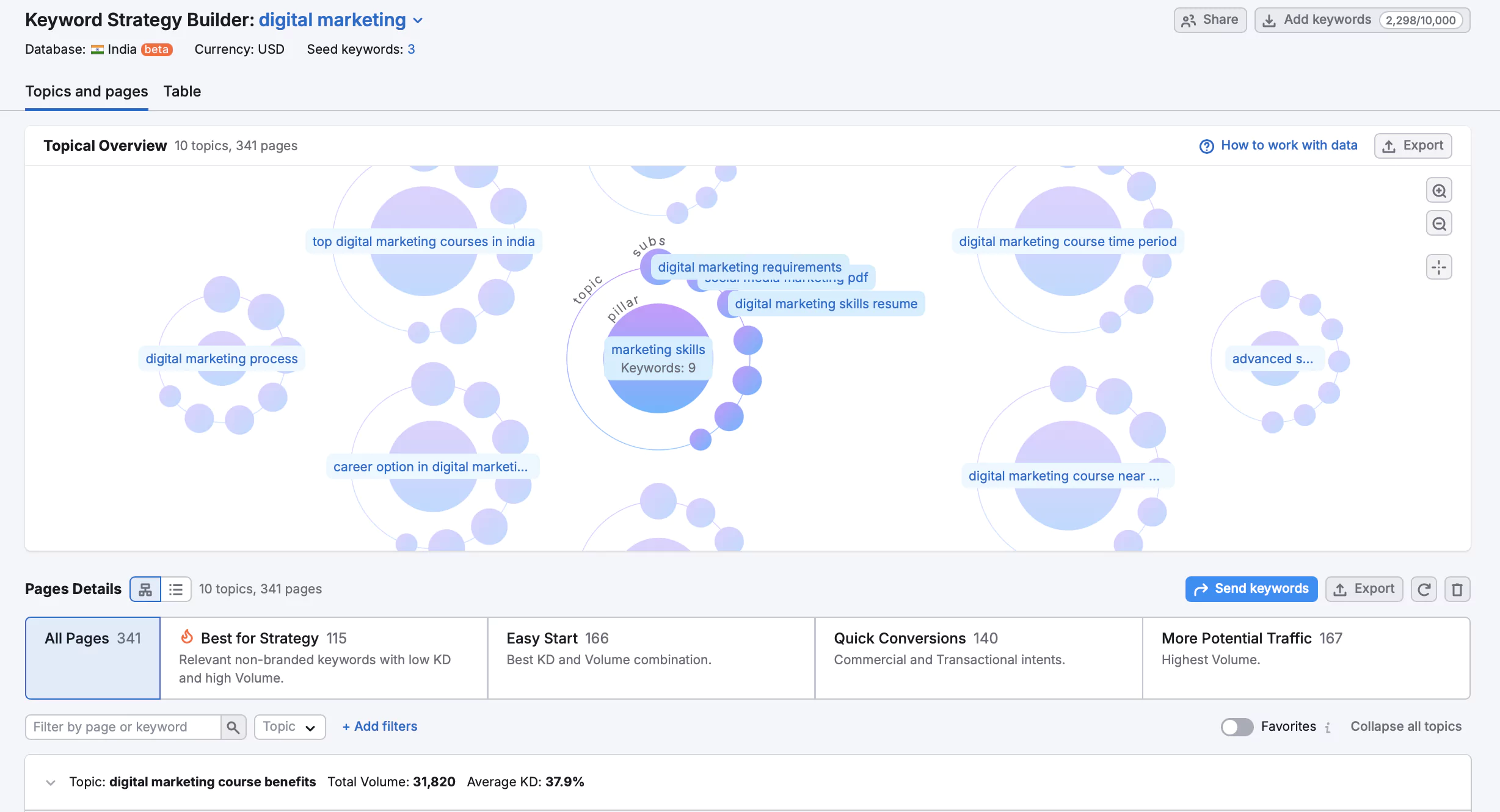
Seed keywords are broad and general terms relevant to your niche and describe your industry and business. These will help you find core topics around your niche. Suppose you are offering a digital marketing course on your site, then seed keywords you might find useful are the following.
- Digital Marketing
- PPC Advertising
- Social Media Marketing
- Internet Marketing
- Online Marketing
- Google Ads
- Email Marketing
- Online Courses
These terms reflect what your website is trying to deliver.
2. Expand your Research with Related Long Tail keywords
Now, locate some of the best long tail keywords relevant to your niche. These phrases are often more specific and offer less competition. For example, when a seed keyword is “Digital marketing course,” then its long tail variations can be as follows.
- Digital marketing course with certificate
- Digital marketing course for beginners
- Affordable Digital Marketing course with placement
- Learn online Digital Marketing from scratch
3. Explore Your Competitor
Check what your competitors are ranking for, find their SEO keyword strategy, and list them in your strategy. You might also find keyword gaps that you might be missing, which can bring good traffic and engagement to your site.
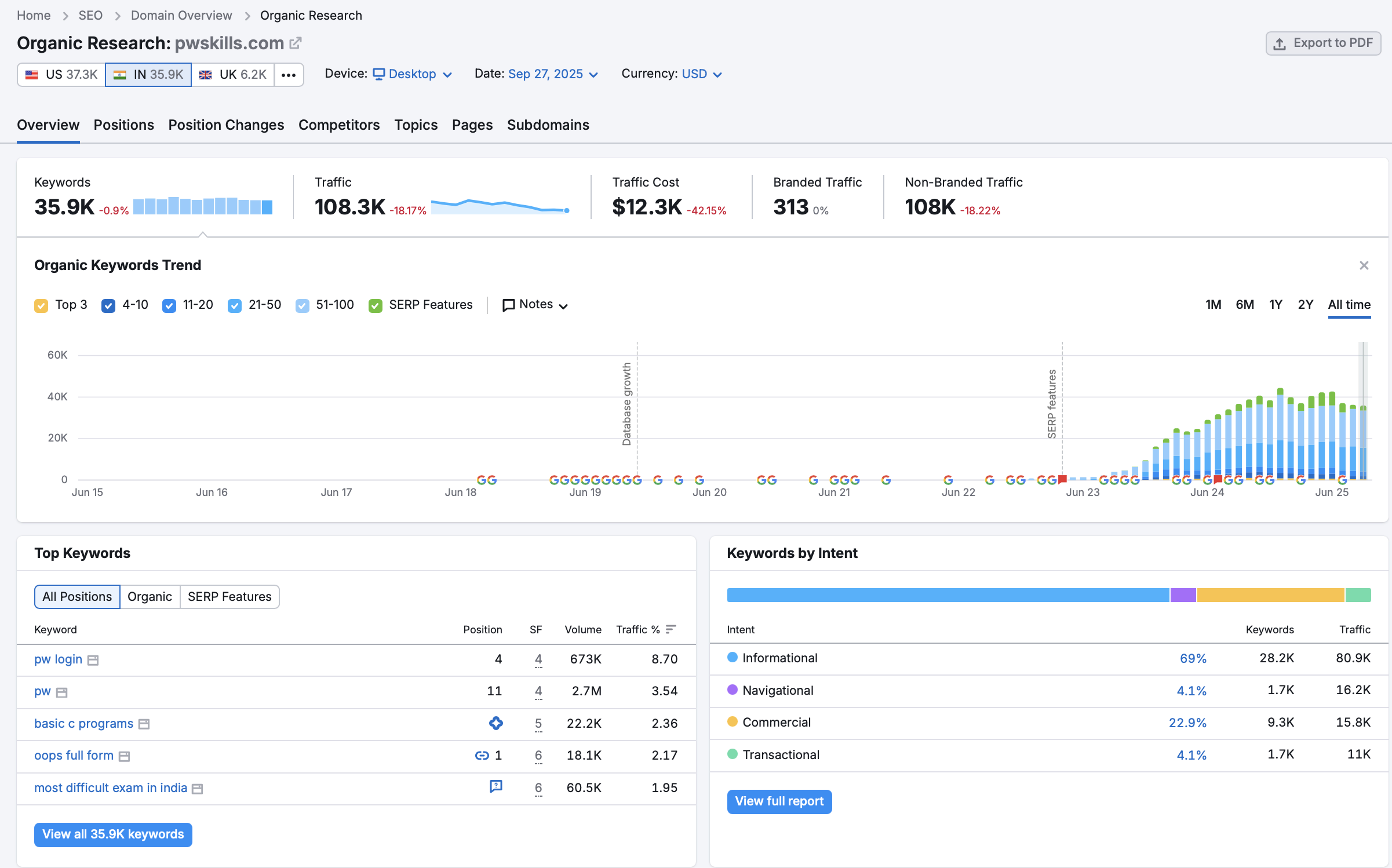
- You can take the help of Google Keyword Planner to check the top ranking pages and keywords, even if you are not running ads.
4. Prioritize Keyword Metrics
Some of the keyword metrics, such as relevance, monthly search volume, Keyword difficulty, keyword density, and search intent, are important when you are researching the best list of keywords for your page.
- Prioritize using keywords with low difficulty and more relevant intent, matching your content types and audience.
- Keep a good balance of long tail keywords with short tail keywords
- Optimize your website for branded keywords to help interested or highly potential audience to your site.
SEO Keywords FAQs
Q1. What are SEO keywords?
Ans: SEO Keywords are phrases or terms used by professionals to get organic traffic, engagement, and conversions through Google search result pages.
Q2. How to find SEO Keywords?
Ans: You can find SEO keywords using smart Keyword research Tools. people also ask section, Google Autocomplete, and more.
Q3. How to choose SEO keywords for content?
Ans: You have to check the organic presence of a particular keyword on the internet. Check the search volume, keyword difficulty, and search intent before selecting a keyword for your content.
Q4. What are the four main types of SEO Keywords?
Ans: Informational, navigational, commercial and transactional keywords are four major types of keywords used in SEO.

